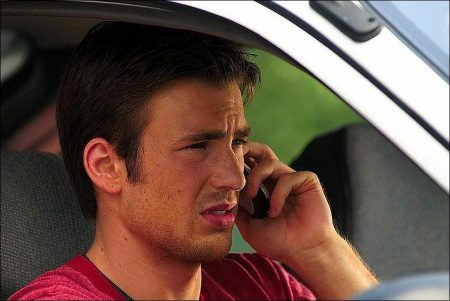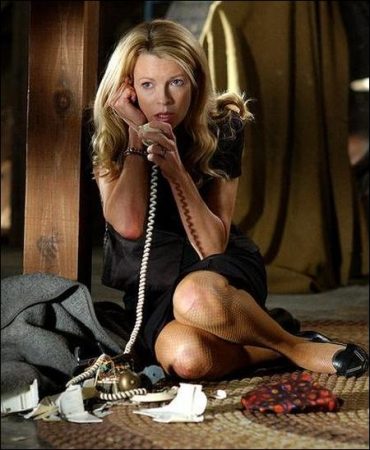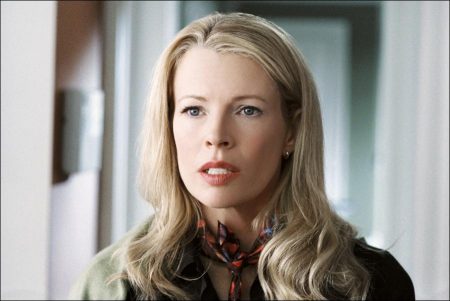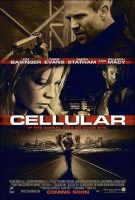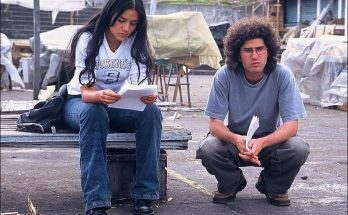Tagline: If the signal dies so does she.
What if you received a call on your cell phone from a complete stranger, with the frantic voice on the other end begging you to help save her life? Would you hang up immediately, thinking it’s a prank? What if there’s even a remote chance the caller is serious and you’re their only remaining hope? What would you do?
A random wrong number on his cell phone sends a young man into a high-stakes race against time to save a woman’s life in the action thriller Cellular, a fast-paced film reminiscent of such edge-of-your-seat thrill rides as Speed.
Academy Award winner Kim Basinger (The Door in the Floor, L.A. Confidential) stars as Jessica Martin, a high school science teacher and mother whose peaceful life is turned upside down when she is kidnapped from her home by five unknown assailants and taken to a mysterious location.
Fearful for her life and completely in the dark as to her abductors’ motives, Jessica manages to patch together a shattered telephone and secretly place a call to an unknown number in a last-ditch attempt to save herself. Ryan (Chris Evans of The Perfect Score and Not Another Teen Movie), the carefree young man who answers the panicked call, suddenly finds himself Jessica’s last hope.
Cellular is a 2004 American action crime thriller film directed by David R. Ellis and starring Chris Evans, Kim Basinger, Jason Statham, Jessica Biel, Noah Emmerich, William H. Macy, Chantille Boudousque, Robin Brenner, Chelsea Ellis Bloch, Nikki Christian and Valerie Cruz. The screenplay was written by Chris Morgan and Larry Cohen.
About the Film
Rrrring… Rrrring… Rrrring… A simple cell phone ring sets off a high-speed, high-stakes adventure in the action thriller Cellular. The film follows an apathetic 20-year-old’s transformation from surfing slacker into heroic figure when fate calls on him to save the life of a kidnapped woman, forcing him to race through the streets of Los Angeles in an effort to locate her.
Ironically, the story behind how Cellular came to be is packed with nearly as many twists and turns as the final film itself. The project originated several years ago when a script penned by Larry Cohen – the screenwriter behind another acclaimed phone-related thriller, Phone Booth – came across the desk of Lauren Lloyd, who was working as a Sony Pictures Executive Vice President at the time. Lloyd liked what she read, but was unable to rally her fellow executives to acquire the project. Still, there was one key element to the story that captured her attention.
“When I first read the script, it was about a guy who wasn’t very heroic,” says Lloyd. “He was a driver for a bank robbery and the woman wasn’t really kidnapped. But this single idea of staying on a cell phone when someone’s life is in danger and being unable to hang up, seemed so visceral and immediate that I loved the script.”
Shortly after reading the original Cellular script, Lloyd left Sony to become an independent producer. Remembering the potential she saw in the script, she quickly acquired it for herself. Lloyd then took the script to her close friend Dean Devlin, the accomplished producer behind such action blockbusters as Independence Day and The Patriot. Devlin took to the concept and agreed to team up with Lloyd to further develop the project.
Wanting a fresh take on the concept, Devlin and Lloyd brought in screenwriter Chris Morgan, and together they hammered out what would eventually become the final Cellular storyline. For Morgan, the film offered a chance to write the kind of action movie that had always appealed to him – a story about how an everyday person can become heroic when faced with a certain set of trying circumstances.
“I’ve always been a fan of movies where the hero isn’t the smartest or toughest guy, but he is the one with the most heart – someone like Indiana Jones, for example,” says Morgan. “And we got really lucky with the casting of Chris Evans, who plays Ryan, because he pulls that off so well. You really believe he’s going to go the distance and once you get him on your side, he’s a full-on hero.”
Morgan also helped inject some humor into the script. Although the film is largely a mixture of fast-paced action and nail-biting suspense, it also manages to mix in its share of comic moments. “I’m a big fan of situational humor and I feel like comedy plays best when it’s the right thing at the right time and not just somebody trying to make a joke,” says Morgan. “For example, in Raiders of the Lost Ark when Indiana Jones is faced with fighting the swordsman and he just pulls out a gun and shoots him. That’s not really a joke, but it got a huge laugh. That’s the kind of humor we tried to work.”
Once the script was completed, the producers set out to find a director with a unique sensibility who could bring a fresh approach to the film’s action sequences and blend it with the taut suspense that the script promised. They found their man in David R. Ellis. A veteran stunt coordinator and 2nd unit director turned director, Ellis had recently won over audiences and New Line Cinema executives with his work helming the studio’s successful thriller Final Destination.
Ellis quickly took to the project and clicked with the challenge of creating realistic action sequences that were exciting without being just a series of explosions. “This film is really a race against time, but with an ordinary college-age kid at the center of it,” says Ellis. “Ryan isn’t a super-hero and the challenge was to create action that fit with his character.”
Ellis notes that in order to do this, it meant the filmmaking team would have to be creative with the situations and sequences they put their protagonist through. “We had to put him in extraordinary circumstances, but at the same time we didn’t want to see him putting people in jeopardy with cars turning over and catching fire and stuff like that,” he says.
Ellis rose to the occasion as he dealt with this challenge by taking a fresh approach to filming the movie’s numerous action sequences and car chase scenes. Rather than focusing on collisions and wreckage, Ellis instead showcased a different side of these familiar scenes.
“The way in which David shot some of these sequences was unlike any other action sequence I’ve seen in a car chase because it wasn’t about the collisions – it was about the near misses,” says producer Dean Devlin. “That made for a very interesting way to approach the entire sequence.”
Ellis’ style also clicked well with the film’s cast. “David is a very grounded person who has great appreciation for talent. The director can make or break the attitude and atmosphere on the set” says Kim Basinger, who portrays Jessica Martin. “David is the best I have seen at making sure each individual in each department is treated with respect. Besides all that he is just plain fun!”
With a director on board, the next hurdle for the filmmakers was to figure out where to shoot Cellular, and the production team went to great efforts to try to keep the production in the United States. While they originally planned to shoot in the Boston area, story changes and weather concerns eventually shifted the production to Los Angeles.
w“With an enormous amount of films being shot in Canada and overseas to save money, one of the things we’re really proud of is that we were able to actually shoot this entirely in Los Angeles,” says Dean Devlin. “It’s amazing how many people, great crew members, are having a hard time getting work because so much production has left the country. We’re really proud of the fact that we got to shoot in Los Angeles.”
Shooting in Los Angeles proved to be a boon to the production from both a logistical and creative standpoint. “By shooting Cellular in Los Angeles, not only were we able to take advantage of the fact that we have fairly consistent weather, but we were really able to show Los Angeles at breakneck speed because this movie can never stop,” says Devlin. “Chris Evans’ character has to go from LAX to the beach to downtown over the course of this day at nonstop speed. It was really a fun way to rediscover Los Angeles again.”
Once the decision was made to shoot the film in Los Angeles, the next task was to paint a portrait of the city that audiences have never seen before. “What we’re trying to do is open up the movie with the everyday colors that we see in Los Angeles,” says producer Lauren Lloyd. “A lot of times Los Angeles is shown, you see the Hollywood sign or the Sunset Strip and all these things we’ve seen 1,000 times. What we wanted to do was just show the beauty of the city. Especially the sequences on the Santa Monica Pier – the colors there go from the blue of the skyline to the trees and all the colors of the lights flashing.”
But showing the colors of Los Angeles was not as easy as it sounds – particularly with a story that is set completely during the course of a single day. “It’s one of the things that I think audiences won’t think of when they see the film, but the greatest challenge as a filmmaker is that although the story takes place over one day, the actual shoot took place over several months,” says Devlin.
“So to try to have a couple months all look like the same day when the movie is nearly entirely outdoors is an enormously difficult task, and it took great coordination between the production designer, the director, and the director of photography to make it look consistent. The reality is that even though we have fairly consistent weather in Los Angeles, one day is foggy, one day is sunny, one day has clouds, one day has rain, and we couldn’t have that in the film. So we always had to use tricks and we had to be very careful in the way we shot things so that it would all seem like the same day.”
While the filmmakers had to constantly focus on making the look consistent, one thing they knew they could count on was the performances of the talented cast they had assembled for the film. When casting began on Cellular, filmmakers knew they needed to find actors who would be able to pull off the exceptionally challenging roles that the script contained. The search for actors who could handle the requirements of playing everything from isolated suspense to all-out action, resulted in an eclectic group, each of whom brought something different to the production.
For the lead role of Jessica Martin, whose kidnap and predicament sparks the story, producers tapped Academy Award-winning actress Kim Basinger. The demanding role required Basinger to convey a mixture of emotions ranging from fear and weakness to courage and strength as she is mysteriously kidnapped and fights to save the lives of herself and her family.
“It was a hard role to cast because we needed somebody who was sympathetic and could handle the trauma of this role,” says producer Lauren Lloyd. “Because every scene with Jessica, she’s being traumatized and you have to really believe her.”
Basinger proved to be up to the task. “The most surprising thing for me about Kim’s performance was the level to which she was willing to take it,” says producer Dean Devlin. “There was never an ego in her performance. She wasn’t trying to look pretty or heroic. She just allowed herself to be the person in the situation, with all the flaws of that and all the brutality of it.”
For Basinger, the key to the role was trying to get in touch with how a woman would feel in the situation and to come to grips with the tension of the story. “The story is anyone’s frightmare being threatened and kidnapped, all the while not knowing why,” says Basinger. The human question becomes: ‘How do I override this fear in order to think clearly enough to help myself?’”
In order to help herself get in character, Basinger worked closely with director David R. Ellis to create a working environment that simulated the extreme environment her character has been thrown into. “I so wanted my surroundings to be real, I asked David to clear the set except for the very few people who had to be there,” says Basinger. “I wanted to feel totally alone with this emotional, mental, physical challenge and I wanted to pull the audience into the situation with me.”
Cellular (2004)
Directed by: David R. Ellis
Starring: Chris Evans, Kim Basinger, Jason Statham, Jessica Biel, Noah Emmerich, William H. Macy, Chantille Boudousque, Robin Brenner, Chelsea Ellis Bloch, Nikki Christian, Valerie Cruz
Screenplay by: Larry Cohen
Production Design by: Jaymes Hinkle
Cinematography by: Gary Capo
Film Editing by: Eric A. Sears
Costume Design by: Christopher Lawrence
Set Decoration by: Robert Gould
Art Direction by: Domenic Silvestri
Music by: John Ottman
MPAA Rating: PG-13 for violence, terror situations, language, sexual references.
Distributed by: New Line Cinema
Release Date: September 10, 2004
Visits: 72
